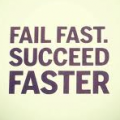 Buddhism, like any religion, celebrates its own unique values and traditions and although the words ‘peace’ and ‘tranquillity’ may not come to mind when you’re thinking about improving your productivity levels, absorbing Buddhist teachings might actually prove quite useful whilst your climbing the ladder.
Buddhism, like any religion, celebrates its own unique values and traditions and although the words ‘peace’ and ‘tranquillity’ may not come to mind when you’re thinking about improving your productivity levels, absorbing Buddhist teachings might actually prove quite useful whilst your climbing the ladder.
4 Lessons from Zen Buddhism
1. “A Jug Fills Drop By Drop”
Something I’ve noticed about most fast-paced people is that they are reluctant to start small. Reluctant to get a job that is beneath them, to start a project with someone who isn’t quite as bright or to take on a task that isn’t particularly life changing.
I want you to know that it’s okay to start at the bottom of the food chain. In the end thoughts become things, but you have to have the resources to make that transition.
2. Forgiveness, Gratitude, Understanding & Peace

Just because you’re bringing coffee to world famous publishers today doesn’t mean you won’t have published a world famous book tomorrow. It just means that you’ll have the resources – money, contacts, knowledge – to in the end, do it right.
Success is a jug and nobody is going to fill it for you, instead you have to work until it’s filled to the top. And if you have the positive attitude to do this you will succeed. In the words of Buddha himself, “What you think, you become.”
It’s easy to get trapped in the office lifestyle when you’re there every day, just as it’s easy to bitch, get angry, and stress out when something goes wrong. But is this really the best way to make a positive change? Forgiveness, gratitude and seeking to understand are three key characteristics that Buddhists display in the face of suffering and are much more productive ways of going about the issues at hand.
Think about it. Simply saying, “It’s okay” in the face of a problem takes far less energy than throwing a tantrum and chances are that the person on the receiving end is more likely to make a change to their behaviour if you ask them about it nicely. In this sense we can see why Buddhists compare anger to a ‘hot coal’. Throwing it will hurt the other person, as intended, but in the long run holding onto that bad feeling will hurt you too.
3. Stay True To What You Know & What You Believe

If you already know what you want and what you believe, that’s great – make it your aim to channel these ideas in their purest form, every day. However, if you don’t know what you want or what you believe, then make an effort to try and discover what that is.
As said in the previous point it is very easy to get wrapped up in the office lifestyle – materialistic things included – but a set of simplistic values is much more effective in the face of success because they are less easily distracted and form much more fulfilled happiness’s in the long run.
So when you start a new project, start from scratch. Clear your mind of everything and anything outside your purpose, and plan your goals around the values you have discovered. In order to focus, we have to know where we’re going. If you know where you’re going, the rest will fall into place and chances are you’ll be much happier for it.
4. It’s Your Actions That Count
When Buddhists preach about the quality of action rather than words they most likely mean it in terms of religion. For example, there is no point in someone reading the Tipitaka, agreeing with the Tipitaka and then not acting upon what they have learned. It’s up to us to put action into the elements of ourselves that we want to improve. The same can be applied to entrepreneurs.

If you read a book about great leadership or say… a great post about the lessons you can learn from Buddhism – act upon what you’ve learnt. Dreams are great to have. They give us purpose, a future, something to aim for.
But if you don’t break that dream down into a physical plan of action and if you’re not working at it every day, chances are you won’t get anywhere. You are responsible for your own awakening. Accept the past, prepare for the future but don’t get hung up on either; live in the moment. Take action today.
I’m not saying that you have to change your religious beliefs to be successful, but what I am saying is that we, members of such a modernised and fast paced society, could do with learning a little something from the Buddhist lifestyle; whether this is simply trying out meditation or biting your lip next time your boss has a go.
Religion is sadly, a dying thing. But the kind of values and morale that religions like Buddhism can bring to the quality of our lives are commendable and there is always, always, always room for improvement.
Wrote by Aimee Hall





